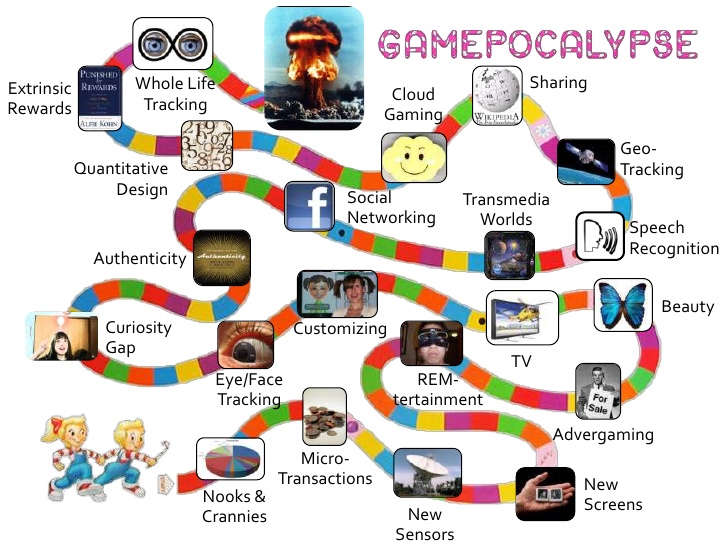Core Data:
- Vision: The Gamepocalypse
- Type: Industry talk/presentation
- As Seen In: The Long Now Foundation
- Envisioned: July 27 2010
- Visionary: Jesse Schell
- Target Date: 2020
Overview:
In 2010 American game designer and developer Jesse Schell addressed the Long Now Foundation to outline his vision of the future of gaming and the ongoing creep of gaming tools, technologies and techniques into our everyday lives.
Schell highlighted a number of key areas which enabled game-like activities to enter the real world, including micro transactions, low-cost sensors, marketing-driven gaming, the growth of social media, location-awareness, speech recognition and data-sharing, as opportunities for business and government to recognise and reward activities and behaviours.
While the talk predated the ongoing rise of social media, the advent of ‘smart’ devices, and the ubiquity of micropayments, Schell predicted much of the activity which we now take for granted, across our digital lives.
Schell looked beyond the ‘badges, achievements, and leaderboards’ trend of gamification in the early 2010s to see the value of more meaningful engagement with individuals. He foresaw, people interacting through multiple channels and devices, with creators of all kinds using a combination of ‘playful thinking’, ‘applied gaming’, and big data, to create a society in which the decisions, activities and consumption (of food, media and entertainment) contributed to tangible rewards from private business, consumer brands, and government.
Rather than focus upon to growth of a single immersive ‘metaverse’ platform, Schell explores the ways in which multiple elements, devices, platforms and activities throughout an individual’s normal day will create data, which can then utilised to recognise and reward individual (and society) actions to help recognise, reward and potentially change behaviours for desired commercial, or social outcomes.

Key Tenets:
- Hardware: Smartphones, fitness trackers, low cost sensor-enabled FMCG devices (toothbrushes, cereal packets, etc), social media networks, big data, cloud computing, public surveillance, contactless payment systems, wearable technologies.
- Economics: Individuals will be rewarded with real and virtual currency, discounts on real-world items, and access to exclusive content and events, based upon their engagement with brands (listening to, or talking about adverts), consumption of media (watching, or listening to specific content channels/services), activities (brushing teeth, shopping, exercise), and decisions (using public transport, buying healthier snacks, etc.)
- Individuals will pay for access to these services, by their engagement with the brands and services, the harvesting of their personal data (location, preferences, purchase data, social contacts, etc) and access to their personal contacts.
- Experience: The gamepocalypse does not offer a single point of contact. Rather it is spread across multiple devices, services, and activities, each offered by a different organisation. The ‘player’ will sign up for a social channel from one company, buy a fitness tracker from another, sign up for a loyalty scheme with yet another, and a smart device (toothbrush, kettle, fridge) from someone else.
- The experience can be passive (step count, activity and location tracking), or active (shopping, watching adverts, making decisions). It can be either opt in, or opt out.
- Each of these experiences will generate data which can be captured and utilised by the companies providing the hardware/software/products/services, which can be monetised and shared to create a ‘big data’ digital footprint for each user.
- Rewards can be direct (currency, discounts, access to content) or indirect (access to friends, family and contacts, inclusion within a community, collaboration with other users, shared interests (finding those with similar interests/tastes/opinions).
- While there is no sole organiser, the experiences are connected via data, which can be shared and accessed by multiple participants, with or without the user’s explicit permission or knowledge.
- Experiences can be branded as games, advertising, communities, social media, campaigns, loyalty schemes, lifestyle, or other.
- IP: The gamepocalypse is owned by many different corporations and organisations, each of which own their own specific elements or aspects of the participant’s experience. The entry points, whether via software (apps, social channels, websites, etc.) or hardware (fitness tracker, Apple Watch, Smart toothbrush, etc.) may be owned, as is the data generated through that access point, but the data may be monetised and shared for increased targeting and hyper specific advertising.
- Companies: Examples of companies now engaged in these type of activities include Facebook (social media), Strava (fitness tracking), Apple (Apple Watch, iPhone, iCloud, Music, Apple TV, etc.), Netflix (media streaming), YouTube (media streaming, content creation), Starbucks/Tesco/MacDonalds (loyalty schemes, competitions).
State of Play (May 2021)
- Hardware: Every smart device, from phones, to watches, to fitness trackers and toothbrushes are now connected to the Internet, as are social networks, streaming services, online stores, and apps. In many cases these devices are producing and sharing data with their creators and (potentially) third parties
- Concept: The concept of ‘gamification’ has been widely discredited and fallen out of favour within the general gaming industry and community. A more focused and academically rigorous approach to the use of tools, technologies and techniques from the gaming ecosystem referred to as ‘applied games’ has found a niche, but remains outside the mainstream. However, many of the concepts put forward by Schell, from smart devices offering rewards and the data economics of social networks, are now an integral part of many people’s everyday lives.
- Economics: The ‘data economy’ is now fully accepted as the primary business model for many of the leading social networks in use around the world, while a growing number of businesses around the world are building direct engagement with their users in return for access to their data, contacts, preferences and daily activities.
- IP: The gamepocalypse is distributed with multiple companies owning the access points, devices, services, and data.
Summary
Despite the original vision being delivered in 2010, Schell’s Vision of the Gamepocalypse remains relevant and nearly prescient today. While some aspects have dated, the core message remains wholly relevant to the emergence of gaming and game-like experiences as part of our everyday lives.
Instead of speculating about technologies, or platforms, The focus upon the user experience, engagement, business models and the need ‘trusted experiences’ provides the Gamepocalypse model with a high level of future-proofing. This ensures it will remain a valuable perspective on the ‘application’ of games within a real-world context, even as the Metaverse, transmedia, and immersive media emerge, evolve and disrupt the very definition of gaming.
Visions of the Gamepocalypse
Further Reference:
- Jesse Schell – When Games Invade Real Life (Feb 2010)
- Jesse Schell – Visions Of The Gamepocalypse (Jul 2010)
- Jesse Schell – The Pleasure Revolution (May 2013)
Other Sources:
Brian has been working in the games industry since the mid-1990s, when he joined the legendary studio DMA Design, as a writer on the original Grand Theft Auto. Since then he's worked with major publishers, founded his own digital agency, and the Scottish Games Network. At various times he's worked as a journalist, editor, narrative designer, lecturer, executive producer, and director.



































